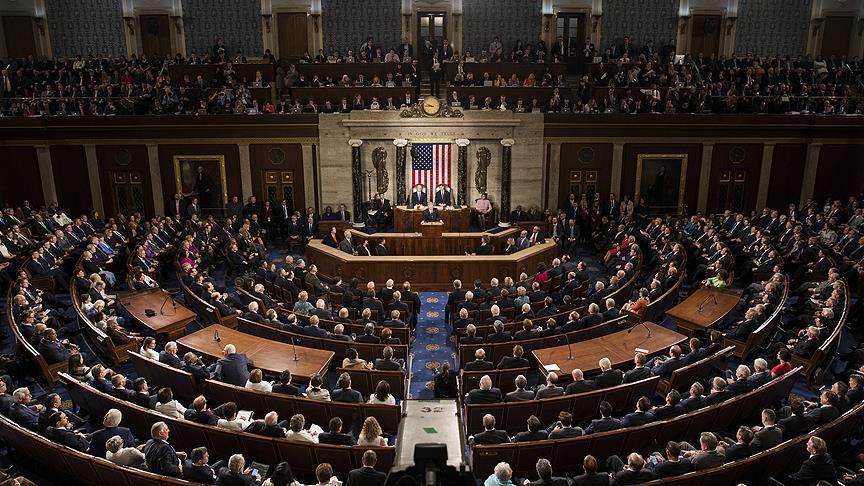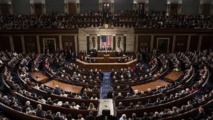Trump said Americans earning less than 100,000 dollars would be eligible for a payroll tax holiday through the end of this year, after which they would be required to pay the deferred taxes. But he said that if he is reelected in November, he would forgive the deferred taxes and make the cut permanent.
Democrats roundly criticized Trump's actions.
"This is not presidential leadership. These orders are not real solutions," said presumptive Democratic presidential nominee Joe Biden. "They are just another cynical ploy designed to deflect responsibility. Some measures do far more harm than good."
House Speaker Nancy Pelosi, D-Calif., and Senate Minority Leader Charles E. Schumer, D-N.Y., called on Trump and Republicans to return to the negotiating table to work out a bill.
"We're disappointed that instead of putting in the work to solve Americans' problems, the president instead chose to stay on his luxury golf course to announce unworkable, weak and narrow policy announcements to slash the unemployment benefits that millions desperately need and endanger seniors' Social Security and Medicare," the Democratic leaders said in a statement.
Speaking for the second time this week before a small crowd of supporters who cheered the president at his New Jersey golf club, Trump gave a disjointed speech. He accused top congressional Democrats of blocking desperately needed financial assistance and claimed the economy was "coming back very very strong."
The orders Trump signed, he said, would "take care of pretty much this entire situation."
However, it's unclear whether Trump has the legal authority to make such changes on his own, because the power to collect taxes, spend money and write laws rests with Congress. His orders are expected to face legal challenges from Democrats that could blunt their influence.
Asked on Saturday whether his decision to reduce the weekly payments to unemployed workers by 200 dollars would pose a hardship, Trump said it would not. "This gives them a great incentive to go back to work," he said. "There was difficulty with the 600 dollars number because it really was a disincentive."
The president's decision to act on his own is the result of his administration's inability to reach a bipartisan deal with Congress.
Trump may be hoping his orders change the political dynamic around the stalled negotiations. But major areas of disagreement remain after 11 days of negotiations, most crucially over how much to spend overall.
Democrats, who control the House, are asking for 3.4 trillion dollars. Republicans, who control the Senate, want to keep the stimulus under 1 trillion dollars.
Pelosi told reporters that Democrats offered on Thursday to decrease their ask by 1 trillion dollars if Republicans increased theirs by 1 trillion dollars, compromising at roughly 2.4 trillion dollars. She said the cut would come from making some programs expire earlier than planned.
Democrats made the offer again in a roughly one-hour meeting Friday but were turned down, according to Schumer.
"We could begin to meet in the middle," he said. "Unfortunately, (Republicans) rejected it. They said they couldn't go much above their existing 1 trillion dollars, and that was disappointing."
"I've told them, 'Come back when you're ready to give us a higher number,'" Pelosi said.
Although both sides have made concessions in some areas, remaining points of disagreement include how much to provide for unemployment insurance, whether to continue delaying student loan payments, whether Congress should impose an eviction moratorium, or help renters make payments, and how much to provide to help schools reopen and to help state and local governments weather the crisis.
In a letter to colleagues Friday, Pelosi laid out the differences that remain, including:
Democrats want 75 billion dollars for Covid-19 testing and treatment, while the GOP wants 15 billion dollars.
The GOP has offered 150 billion dollars for states and municipalities; Democrats propose 915 billion dollars.
She wrote that the sides are "a couple hundred billion dollars apart" on money to help schools reopen. Republicans included 105 billion dollars for schools in their proposed legislation.
Pelosi called for 67 billion dollars for food, water and utility assistance. The GOP has proposed 250,000 dollars for food.
Another major point of contention is the amount at which the federal government should supplement state unemployment insurance.
The 600-dollar-a-week extra unemployment benefit that Congress approved in March expired at the end of July. Democrats passed legislation in May that would extent those payments through the end of the year, but Senate Republicans have not acted on it. They have floated multiple counter-proposals, including 400 dollars for 20 weeks or 70 per cent of wage replacement with a 600-dollar cap.
"We have always said that the Republicans and the president do not understand the gravity of the situation, and every time that we have met, it has been reinforced," Pelosi told reporters.
White House Chief of Staff Mark Meadows said Democrats haven't been willing to budge on how much they think the federal government should provide to supplement state unemployment insurance or to state and local governments.
"Both of those are still where they were two weeks ago," Meadows said Friday. He said he was recommending the president issue orders for the time being.
"We're going to take executive orders to try to alleviate some of the pain that people are experiencing," Meadows said. "This is not a perfect answer - we'll be the first ones to say that - but it is all that we can do and all the president can do within the confines of his executive power."
Democrats roundly criticized Trump's actions.
"This is not presidential leadership. These orders are not real solutions," said presumptive Democratic presidential nominee Joe Biden. "They are just another cynical ploy designed to deflect responsibility. Some measures do far more harm than good."
House Speaker Nancy Pelosi, D-Calif., and Senate Minority Leader Charles E. Schumer, D-N.Y., called on Trump and Republicans to return to the negotiating table to work out a bill.
"We're disappointed that instead of putting in the work to solve Americans' problems, the president instead chose to stay on his luxury golf course to announce unworkable, weak and narrow policy announcements to slash the unemployment benefits that millions desperately need and endanger seniors' Social Security and Medicare," the Democratic leaders said in a statement.
Speaking for the second time this week before a small crowd of supporters who cheered the president at his New Jersey golf club, Trump gave a disjointed speech. He accused top congressional Democrats of blocking desperately needed financial assistance and claimed the economy was "coming back very very strong."
The orders Trump signed, he said, would "take care of pretty much this entire situation."
However, it's unclear whether Trump has the legal authority to make such changes on his own, because the power to collect taxes, spend money and write laws rests with Congress. His orders are expected to face legal challenges from Democrats that could blunt their influence.
Asked on Saturday whether his decision to reduce the weekly payments to unemployed workers by 200 dollars would pose a hardship, Trump said it would not. "This gives them a great incentive to go back to work," he said. "There was difficulty with the 600 dollars number because it really was a disincentive."
The president's decision to act on his own is the result of his administration's inability to reach a bipartisan deal with Congress.
Trump may be hoping his orders change the political dynamic around the stalled negotiations. But major areas of disagreement remain after 11 days of negotiations, most crucially over how much to spend overall.
Democrats, who control the House, are asking for 3.4 trillion dollars. Republicans, who control the Senate, want to keep the stimulus under 1 trillion dollars.
Pelosi told reporters that Democrats offered on Thursday to decrease their ask by 1 trillion dollars if Republicans increased theirs by 1 trillion dollars, compromising at roughly 2.4 trillion dollars. She said the cut would come from making some programs expire earlier than planned.
Democrats made the offer again in a roughly one-hour meeting Friday but were turned down, according to Schumer.
"We could begin to meet in the middle," he said. "Unfortunately, (Republicans) rejected it. They said they couldn't go much above their existing 1 trillion dollars, and that was disappointing."
"I've told them, 'Come back when you're ready to give us a higher number,'" Pelosi said.
Although both sides have made concessions in some areas, remaining points of disagreement include how much to provide for unemployment insurance, whether to continue delaying student loan payments, whether Congress should impose an eviction moratorium, or help renters make payments, and how much to provide to help schools reopen and to help state and local governments weather the crisis.
In a letter to colleagues Friday, Pelosi laid out the differences that remain, including:
Democrats want 75 billion dollars for Covid-19 testing and treatment, while the GOP wants 15 billion dollars.
The GOP has offered 150 billion dollars for states and municipalities; Democrats propose 915 billion dollars.
She wrote that the sides are "a couple hundred billion dollars apart" on money to help schools reopen. Republicans included 105 billion dollars for schools in their proposed legislation.
Pelosi called for 67 billion dollars for food, water and utility assistance. The GOP has proposed 250,000 dollars for food.
Another major point of contention is the amount at which the federal government should supplement state unemployment insurance.
The 600-dollar-a-week extra unemployment benefit that Congress approved in March expired at the end of July. Democrats passed legislation in May that would extent those payments through the end of the year, but Senate Republicans have not acted on it. They have floated multiple counter-proposals, including 400 dollars for 20 weeks or 70 per cent of wage replacement with a 600-dollar cap.
"We have always said that the Republicans and the president do not understand the gravity of the situation, and every time that we have met, it has been reinforced," Pelosi told reporters.
White House Chief of Staff Mark Meadows said Democrats haven't been willing to budge on how much they think the federal government should provide to supplement state unemployment insurance or to state and local governments.
"Both of those are still where they were two weeks ago," Meadows said Friday. He said he was recommending the president issue orders for the time being.
"We're going to take executive orders to try to alleviate some of the pain that people are experiencing," Meadows said. "This is not a perfect answer - we'll be the first ones to say that - but it is all that we can do and all the president can do within the confines of his executive power."









 Home
Home Politics
Politics











